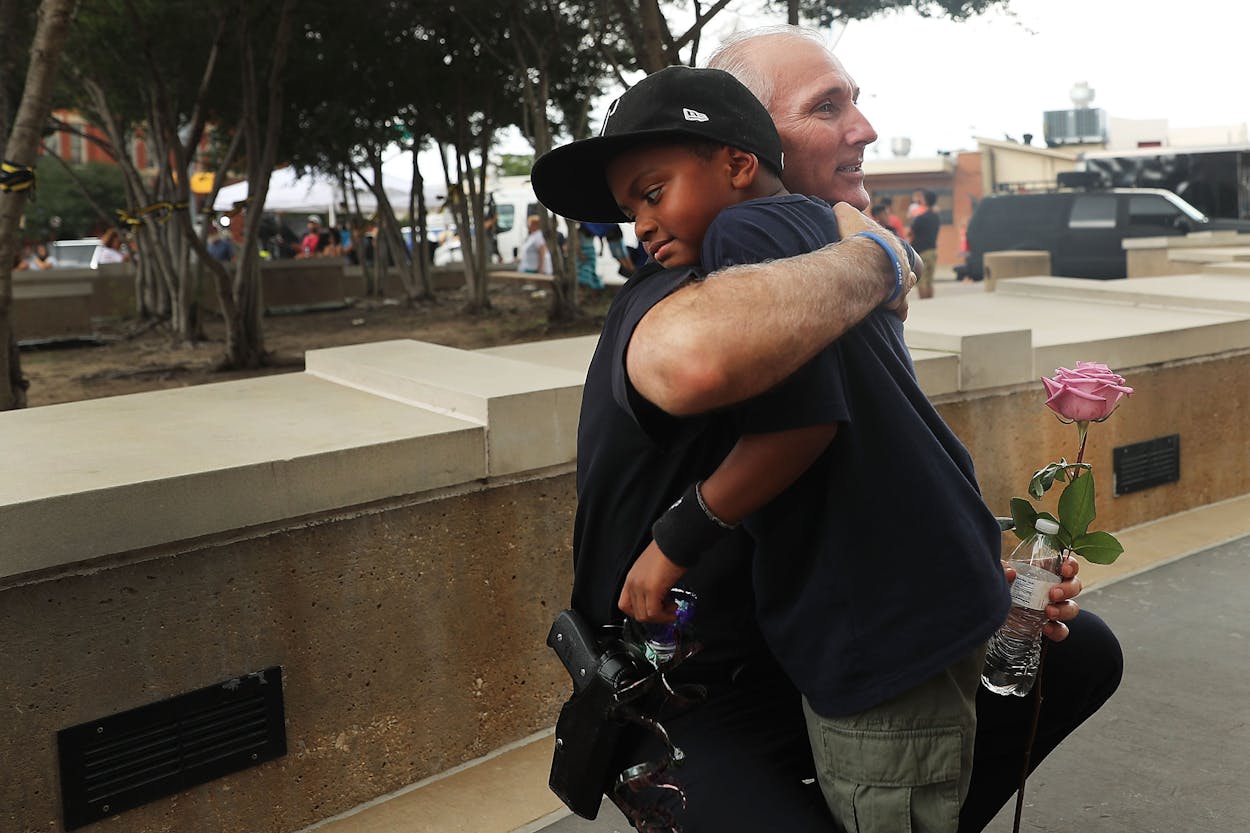It’s been a long, sorrowful week for the United States, and it’s sobering to think how much worse it might have been if not for the strength and compassion the citizens of Dallas have shown since last Thursday, when a gunman opened fire during a Black Lives Matter protest. The shooting left four Dallas Police officers and one DART officer dead, and left the city itself at the center of an unforgiving national spotlight. The ambush in Dallas was an act of crazed hatred and, as such, inherently senseless and unjustifiable. Even so, it could easily have left the nation even more divided than we already were over the issues that gave rise to the Black Lives Matter movement in the first place and had led to Thursday’s protest, after the police killings of two black men, Alton Sterling and Philando Castile, earlier in the week.
But thus far at least the tragedy in Dallas doesn’t seem to have reinforced our preexisting hostilities. If anything, Americans have responded with an anomalous degree of decency. So too have most politicians and partisans, as Jamelle Bouie noted at Slate on Friday:
But the events of the past week—and perhaps the shared sense that we’re on a brink of some sort—have inspired a basic decorum. Black Lives Matter has fiercely condemned the violence in Dallas, and beyond the right-wing fever swamps, there’s no apparent effort to cast blame on the movement against police brutality. At the risk of indulging the soft bigotry of low expectations, this week has revealed the strength of American society at the same time it has exposed its most fragile parts.
The possibility Bouie raises, that the events of last week have given rise to a shared sense of danger, seems plausible to me, but I’d like to suggest another possibility. The leaders of Dallas, led by Police Chief David O. Brown and Mayor Mike Rawlings, have explicitly and assertively rejected partisan arguments about the tragedy they’ve been dealing with; since yesterday, when national, state, and local leaders gathered in Dallas for an interfaith memorial service, I’ve been wondering if they’ve thereby made it possible for others to do otherwise. Officially, the service yesterday was dedicated to the five officers who lost their lives—Michael Smith, Michael Krol, Lorne Ahrens, Patrick Zamarripa and Brent Thompson. Along the way, speakers paid tribute to law enforcement, and city leaders more generally. Intriguingly, though, all the officials who spoke went out of their way to be inclusive; they were honoring cops but also, simultaneously, embracing their national critics.
Yesterday’s explicit calls for unity, in other words, weren’t merely perfunctory political rhetoric in response to a high-profile tragedy. They were, if nothing else, backed by acknowledgements that the debate over racial disparities in America’s justice system has become dangerously polarized. George W. Bush, in one of his rare public appearances since leaving the presidency, put it well: “Too often we judge other groups by their worst examples, while judging ourselves by our best intentions.”
The most eloquent statement yesterday, though, was the one being made by the people of Dallas, and particularly the law enforcement officers who attended the memorial service. As Barack Obama noted in his remarks, the Dallas Police Department and Chief Brown were known, even before last week, for an outlying commitment to improving relations with the community. And there’s a cruel irony to the way they were targeted last Thursday: “Despite the fact that police conduct was the subject of the protest, despite the fact that there must have been signs or slogans or chants with which they profoundly disagreed, these men and this department did their jobs like the professionals that they were.” They’ve continued to do so since then, in part by setting a salutary example: Dallas police have defined themselves as members of a community rather than just members of the blue team. By doing so they effectively insisted on the decency we saw at yesterday’s memorial service, from Republicans and Democrats alike. Let’s hope it continues a little while longer.







